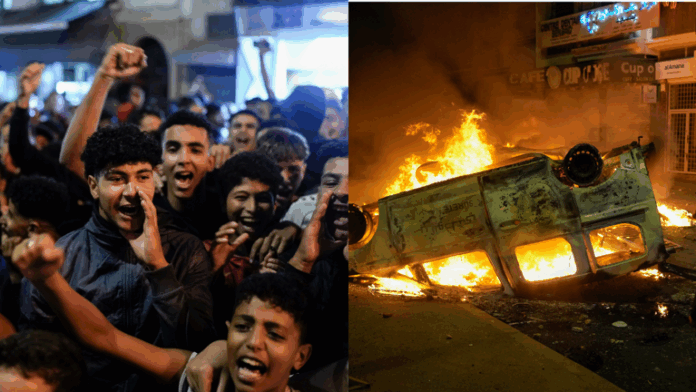A powerful youth movement is shaking Morocco. Behind the slogan “dignity and legitimate rights,” GenZ 212 mobilizes thousands against institutional corruption, economic exclusion, and the illusion of reform. The monarchy, caught between image management and real governance, responds with repression, and death.
The Streets Erupt: Gen Z’s Reckoning with the Moroccan State
The Moroccan regime, long adept at disguising stagnation as stability, now faces an unprecedented generational backlash. Since Saturday, GenZ 212, a decentralized youth-led movement born online, has sparked mass demonstrations across major Moroccan cities, from Rabat to Marrakech. Organized via Telegram and Discord, and spreading virally across TikTok and Instagram, the mobilization marks a new phase in the political awakening of North Africa’s youth.
Initially peaceful, the protests turned violent on Tuesday evening. Clashes with security forces left 263 police officers and 23 civilians injured, according to the Interior Ministry, while over 400 arrests were made, many involving minors.
At the heart of the unrest lies a blunt critique of what the protesters call the government’s “misplaced priorities.” As Morocco commits billions to hosting international football tournaments — 9.5 billion dirhams for stadiums, including a colossal FIFA-standard facility in Casablanca — the country’s public hospitals collapse under neglect. Eight pregnant women recently died at a hospital in Agadir due to lack of care.
A protest placard summed up the outrage with cutting sarcasm:
“At least the FIFA stadium will have a first-aid kit.”
Stadiums Over Hospitals: A Generation’s Breaking Point
The economic rationale is clear — prestige, international investment, and soft power. But the optics, to a generation burdened by unemployment, rising living costs, and institutional rot, are disastrous.
“The hospitals are dying, the youth are jobless — but the stadiums shine,” lamented a protester in Tangier.
Sociologist Mehdi Alioua of Sciences Po Rabat identifies the Agadir hospital tragedy as the catalyst: “It laid bare the broken machinery of governance — where elite-focused infrastructure thrives, but essential public services wither.”
According to official figures, youth unemployment hit 36.7% in 2024, while university graduates and women remain disproportionately excluded. These statistics are not abstract — they define daily reality for millions.
Who Are GenZ 212?
Birthed from the digital underground on Discord, GenZ 212 (named after Morocco’s country code) presents itself not as a political party, but as a citizens’ platform focused on education, healthcare, and anti-corruption. With over 120,000 members as of October 1, the group’s growth is as explosive as its message.
Their slogan:
“Dignity and legitimate rights for every citizen.”
Their language is clear: they reject partisanship, affirm loyalty to the monarchy, and claim no foreign influence — a preemptive counter to the regime’s habitual scapegoating of “external hands.”
“We belong to no political party. We are a free youth. Our voice is independent,” reads their Discord manifesto.
Spontaneous and Digital: A New Mode of Mobilization
What distinguishes GenZ 212 protests in Morocco is their structure — or rather, their deliberate lack thereof. As with youth movements in Nepal or Madagascar, GenZ 212 leverages horizontal organizing, digital anonymity, and rapid real-time coordination. It’s protest without leaders — and that makes it difficult to suppress.
“Telegram and Discord have become the new union halls,” notes Driss Sedraoui, president of the Moroccan League for Citizenship and Human Rights. “The movement is cheap, fast, and agile. It doesn’t need permission.”
Institutional Panic and the Weaponization of Force
The state’s response has been characteristically defensive — curfews, arrests, violent dispersals, and, most recently, lethal force. On October 1, two protesters were shot dead as they allegedly attempted to storm a gendarmerie outpost in Lqliaâ, near Agadir. Authorities claimed “legitimate defense” as justification, alleging that the attackers were armed and seeking ammunition.
It is the gravest incident since the uprising began — and it signals a dangerous escalation.
“The state cannot answer social demands with bullets,” warned Sedraoui.
Across cities like Oujda, Inzegane, Salé, and Beni Mellal, scenes of riot police wielding batons and firing tear gas now define the news cycle. Vehicles torched, bank branches looted — and a regime increasingly painted into a corner.
Corruption, The Unspoken Grievance
Beneath the outrage over stadium budgets and hospital neglect lies a deeper, more systemic anger: corruption. The chants are unambiguous:
“The people want to end corruption!”
The government recently limited the scope of civil society organizations to report on public misappropriation — a move seen as a pre-emptive strike against citizen oversight.
Without accountability mechanisms, the state appears less like a government and more like a cartel: a club of untouchables insulated from the consequences of failure.
Political Reverberations: 2026 Elections and Beyond
The protests erupt at a delicate time. Parliamentary elections are due in 2026, and Prime Minister Aziz Akhannouch — a billionaire businessman with questionable political instincts — now faces mounting calls for resignation.
His promise of one million jobs over five years has yielded few results. The disillusionment is real, and widespread. Even opposition parties like the PSU and FGD have lent cautious support, while the Islamist PJD has stated it “understands the legitimate frustrations.”
But GenZ 212’s strength lies in its refusal to align with any faction — making it harder to co-opt, but also harder to negotiate with.
The Anger Won’t Go Away
Morocco is entering a new political phase, one in which the monarchy’s historic balancing act — between modernity and repression, image and substance — becomes increasingly untenable.
Even if this movement fizzles on the surface, the fracture lines it revealed are deep:
- An economy that works for the few,
- A state that serves global investors before its own citizens,
- A generation that is done waiting.
“There will be a before and after,” warns sociologist Mehdi Alioua. “Even if this mobilization fades, the anger won’t.”



